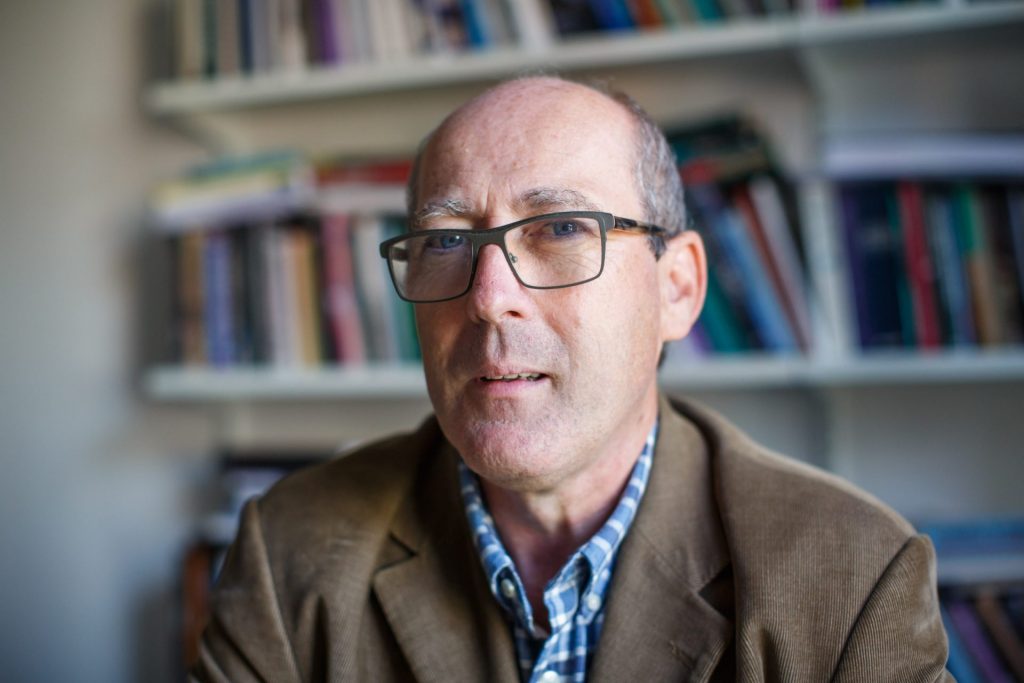For the first profile in our series introducing the personalities who constitute CARC at Kent, Director of CARC and Deputy Head of the School of Politics and International Relations shares his experiences growing up in Northern Ireland, what brought him into the field of Conflict Analysis and his current work on Brexit.
 I have spent more than 25 years being fascinated by political violence and its aftermath, and all of the horror and hope that surrounds questions about why people resort to violence for their political objectives –and why they stop and pursue peaceful methods. One of the first things that intrigued me was why, when States do this –it isn’t called violence anymore. Instead it is called ‘force’ or even just, – ‘the law’. In my particular case I was fascinated by political violence because I grew up in Belfast in the 1970s surrounded by it, when every word was a loaded one and even to refer to it as ‘political’ violence, was to position yourself within that conflict narrative. Over 25 years since finishing my PhD, I’m still as fascinated by political violence as I was when I started out –though I had more answers then and have more questions now.
I have spent more than 25 years being fascinated by political violence and its aftermath, and all of the horror and hope that surrounds questions about why people resort to violence for their political objectives –and why they stop and pursue peaceful methods. One of the first things that intrigued me was why, when States do this –it isn’t called violence anymore. Instead it is called ‘force’ or even just, – ‘the law’. In my particular case I was fascinated by political violence because I grew up in Belfast in the 1970s surrounded by it, when every word was a loaded one and even to refer to it as ‘political’ violence, was to position yourself within that conflict narrative. Over 25 years since finishing my PhD, I’m still as fascinated by political violence as I was when I started out –though I had more answers then and have more questions now.
One of the questions we rarely ask ourselves as academics, is what is it that draws us to the research that we work on- we don’t necessarily spend much time thinking about how we got there in the first place. One of the remaining attractions of being an academic, is the ability to decide on your own research agenda and develop an expertise in an area of your own choosing. Another reason why I think we work on what we do –is that we respond to the world around us. ‘Shit happens’, would be the un-academic version, and our research agendas develop in conjunction with the world we live in. In my case, the shit that happened was the Brexit referendum in June 2016.
For a specialist who has published on the political conflict and peace process in Northern Ireland for over 25 years, whose last political act before coming over to Great Britain for an academic job, was to vote ‘Yes’ in the referendum on the Belfast/Good Friday Agreement in 1998, how ironic it was that a referendum on EU membership in the UK would threaten that very act of self-determination.
Brexit is, in my view, the biggest threat to peace in Ireland since the disintegration of the civil rights movement in the late 1960s. Depending on how ‘hard’ or ‘soft’ a landing we experience, assuming the UK leaves the EU in March 2019, Brexit may yet represent the biggest crisis in Ireland since partition in 1921. Northern Ireland itself will have its 100th birthday in 2021 and it is entirely possible –though still not likely- that it will not last long beyond that as a constitutional entity. So Brexit chose me as a research topic –I didn’t chose it. It has brought back to the surface conflict dynamics that the GFA had submerged. Questions of political and cultural identity that had been anesthetised by the ‘constructive ambiguity’ of the GFA, have been revived by Brexit –and the spectre of a border demarcating the British side and the Irish side of Ireland has re-emerged. Anglo-Irish relations, a key pillar of the GFA, with the British and Irish governments as co-guarantors of the peace process, are at their lowest ebb in several generations. Certainly back to the days of Charles Haughey and Margaret Thatcher in the early 1980s –and potentially going in the direction of the dire relationship between Eamon de Valera and Winston Churchill during the 2nd World War.
Meanwhile, Northern Ireland has set a new world record for an elected government that has not taken office (over 2 years now and counting) due to internal tensions and incompatibilities between the main parties. This- at the very time when Northern Ireland’s interests desperately need defending in the Brexit negotiations. The UK minority government, is propped up by one of those parties, the DUP, while pretending that it is a non-partisan actor in Northern Ireland. Public trust in the capacity of power-sharing to work in Northern Ireland is ebbing away and militant groups in Northern Ireland are taking advantage of the vacuum that has been created and slowly building their capacity for violence.
Some of Feargal Cochrane’s work:
In 2013 I published Northern Ireland: The Reluctant Peace (Yale University Press) a book that looked at the dynamics of the political conflict, the peace process of the 1990s and the political institutions that followed. My forthcoming book, Brexit and Northern Ireland: Breaking Peace, will be published by Manchester University Press in 2020. It explores how Brexit has fundamentally changed the political context of Northern Ireland politics and the challenges it poses for the future.
I am also taking part with my esteemed CARC colleagues Professor Neo Loizides, Dr Ed Morgan-Jones and Dr Laura Sudulich in a United States Institute of Peace (USIP) funded project that examines how a conjoint methodology can shed light on citizen preferences in peace processes. This novel approach differs from normal survey methods that test support or opposition on individual issues –and instead looks at trade-offs that people would be willing to accept, Our initial cases studies are Northern Ireland and Cyprus, but the method can be scaled up to other cases and provides a more nuanced picture of citizen preferences than traditional survey techniques.
We are at a critical moment in British, Irish and European history. In my role as Vice Chair of the Political Studies Association, the leading professional association for political scientists in the UK, I have led an initiative with the Political Studies Association of Ireland (PSAI) to mark the departure of the UK from the EU on 29 March. We have set up a Brexit Countdown Blog – 27 Bogs to represent the 27 remaining EU member states, with the first one on 20 February and the last one on 28th March, (scheduled to be the UK’s last full day as a member of the EU). The Brexit Countdown series will have contributions from England, Scotland, Wales and both parts of Ireland, covering themes such as gender and social justice, young people’s perspectives on Brexit, the future of Scottish independence, the Irish border and peace process, as well as the impact of Brexit on the future of Higher Education across the UK and Ireland. Look out for it on the PSA website https://www.psa.ac.uk/ its twitter feed @PolstudiesAssoc and of course our own @CARCatKent.
Professor Feargal Cochrane is Director of CARC and Deputy Head of the School of Politics and International Relations. He is also Vice Chair of the Political Studies Association and a Trustee of the Oxford Research Group. His book Brexit and Northern Ireland: Breaking Peace, will be published byManchester University Press in June 2020.

